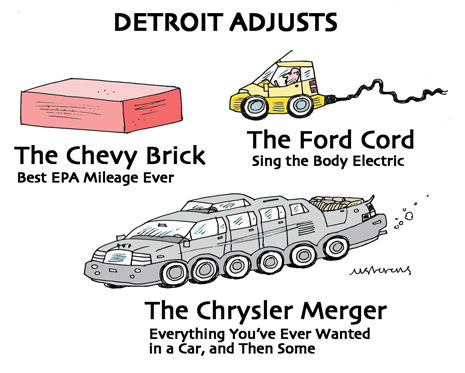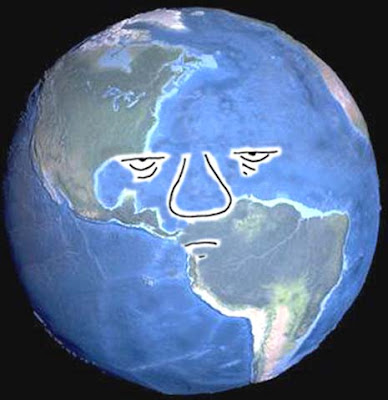As I’ve mentioned, Jack Ziegler is a giant of cartooning, but I may not have mentioned he’s also quite tall, in the neighborhood of 9 feet, if I’m not mistaken. Add to that the fact that we met in Denver, CO., the mile-high city, which seemed to have the effect of making him appear somehow even taller.
We arranged to meet in a dive in downtown Denver which is famous for its high ceilings. I arrived early and sipped a martini while I waited for the Z-man to arrive.
One effect of the altitude in that city is that it increases the effect of alcohol on the mind of the embiber, which in this case may have skewed the following report. Many of the details of our meeting are somewhat vague, still, in this reporter’s mind.
I was having a second martini when the daylight from the open door was blocked by a figure entering the bar. I squinted at the doorway, where I saw the silhouette of Mr. Z, ducking down in an unsuccessful effort to avoid hitting his head on the top of the door-jamb. A string of expletives burst forth from him as he entered the room, startling a group of off-duty nuns who had been hanging out quietly at the bar. They downed the remainder of their chocolate martinis and, donning their sunglasses, flew away.
Mr. Z sat down at my table. There were multi-colored stars and planets spinning about his head and his pupils were rotating in opposite directions. I suggested a martini to alleviate his discomfort, and he quickly agreed. Whenever he spoke, his words appeared briefly above his injured head in a speech-balloon, which I found a bit unnerving at first. I got used to it, though, as the afternoon progressed.
The conversation didn’t go the way I had expected. When I brought up the subject of cartooning and asked his opinion of the current state of our profession, for instance, only a series of large question-marks and exclamation points appeared briefly in the balloons over his head. We ordered another round of martinis. (His drink appeared to contain seven or eight olives, though I might be mistaken about this.) It wasn’t too long after our order arrived that Mr. Z’s twin brother appeared and sat down with him across from me at the table. When the brothers spoke, they did so in unison, though slightly out of sync, complete with overlapping identical speech balloons, which was quite confusing. Another inquiry, asking the standard question, “When you’re working, which comes first, the drawing or the caption?” produced conflicting answers from each of the twins.
A short time later, a dense blanket of gray fog, unusual for this time of year in Denver, among other places, rolled in through the door of the place. It obscured everything, including the Z-brothers across the table. The fog must have deprived my brain of necessary oxygen, because I seem to have passed out shortly after its arrival. I awoke some time later.
On the table, I found a note penned by one of the Ziegler brothers. It contained a cheery farewell and an apology for having to leave early. According to the note, Mr. Z had to rush off in order to make his scheduled annual appearance as Grand Marshall at a parade in his honor somewhere in the Midwest, apparently sponsored by his in-laws.
My only partly legible notes show little of our meeting after the fog appeared. There seems to have been some discussion of Mr. Z’s favorite color, though the page containing his answer to my question on the subject seems to have gotten lost, along with several others. (If anyone at “The Mile-High Pit” there in Denver happens to have found the missing pages, IRSBD would appreciate their return.)
Unless the rest of my notes are found, I’m afraid IRSBD owes its readers an apology. We’re very sorry that we are forced under the circumstances to file such a meager report.
We look forward to subsequent journeys, hopefully more successful in obtaining information of interest for our fans and those of cartooning in general. There won’t be any trips for awhile, however, while we wait for the IRSBD frequent flyer card to refill with enough miles to make another foray into the outside world.
Until then, we will continue to furnish our loyal readers with the robust weekly content they’ve come to expect here.





